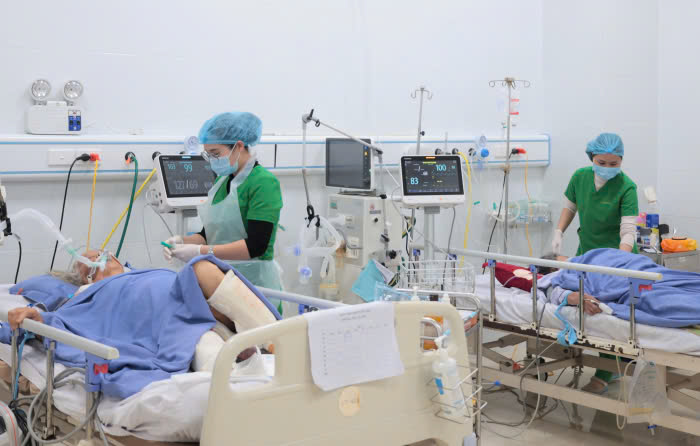A day present at the Intensive Care - Anti-Poison Department, Hospital 199 (Ministry of Public Security) located in Da Nang, I experienced the hardship, pressure, pain, and happiness - the constantly changing emotional states that the medical staff of the department as well as patients' relatives often face.

From pressure and sacrifice...
This is where the most serious and critical patients are concentrated, often facing the death penalty. From victims of serious traffic accidents, to acute respiratory failure, septic shock, poisoning or serious complications after surgery. Each patient coming to the department is a fierce battle, requiring high concentration, quick response and solid professional knowledge.
Doctors and nurses must closely monitor the vital signs of patients 24/24, perform complex emergency procedures such as intubation, temporary heart rate adjustment, ventilator breathing, blood filtration, fluids, use vasopressors... Even they - the doctors who wear the "2 colors of clothes" have put aside personal happiness, including their own safety to complete their noble task. That silent sacrifice is a testament to the noble compassion and sacred responsibility of the doctor.
"The family is a member, my grandfather passed away early, and I am also lucky that my grandmother helps me take care of and take my children to school, especially during the days when I have duty, it is not difficult to stay in the profession for nearly 20 years" - chief nurse Pham Thi Hung shared.

Then, at times, the alarm clock interrupts all activities, pulling doctors and nurses back into the stressful cycle of work. Head of the Intensive Care - Anti-Poison Department, Dr. Pham Van Truong said: "We always have to maintain high concentration, a sense of responsibility and a calm will to face serious cases facing critical condition, making important decisions related to patient life".
The staff at the department, especially the Head Nurses, always have a proactive spirit in work, responsibility and enthusiasm. She is an important bridge in conveying treatment and care information from doctors and nurses to patients and their families and vice versa - Dr. Pham Van Truong added.
Not only that, working at this final "fortress", doctors and nurses also have to face the risk of infection from patients, especially dangerous infectious diseases. Therefore, both doctors and patients' relatives must strictly follow infection prevention procedures, using personal protective equipment to protect themselves.
... to overwhelming happiness!
In this place, every heartbeat can also bring burst-out happiness, where tears and pain are always lurking, where doctors and nurses want to stand firm, not only having professional qualifications but also having health, enthusiasm, and the virtue of sacrifice. And the biggest motivation is the cases that are saved, the patients who recover and return to their families. Each such success is a priceless gift, a great source of encouragement to help them overcome all difficulties and challenges.

Sharing more from Head Nurses Pham Thi Hung: After nearly 20 years of working, I have witnessed a female patient over 50 years old having a malicious attack. When admitted to the hospital with respiratory and circulatory failure, he had to be given an emergency balloon pump and forced to have a heart again. At the department, the patient was in a ventilator coma and maintained vasopressors. The very poor prognosis can lead to death at any time, so doctors and nurses have to be on duty continuously. Everyone was so worried that they were afraid that their family would not be able to come to see the patient's face for the last time. But with miraculous power, the patient opened his eyes and regained consciousness.
The above reality also shows that doctors and nurses are not only professionals, but also empathy and sharing. Because they witness patients struggling with illness, facing the risk of death, in addition to treatment, doctors and nurses are also those who advise and encourage the patients' families. That kindness and thoughtfulness contribute to helping the patient's family feel more confident and trust the medical staff.
It can be said that behind the cases that were saved, the statistics are silent contributions. They are the ones who are writing beautiful stories about humanity, about the noble sacrifice in the medical industry. It is necessary to "see with the eyes and ears" to fully understand the hardship, hardship, pressure and tolerance, and wholeheartedly devote themselves to the patients of the doctors and nurses here.


